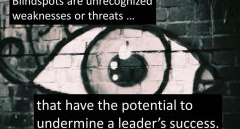
The old adage, “what you don’t know can kill you” is now more relevant than ever before for executive leaders. Just listen to the daily carnage in Washington, Wall Street and Main Street. After coaching hundreds of business owners and mid market executives over the last 12-years, I can testify to this cardinal principle:
Every leader suffers from a blind spot and it’s how they manage it that determines their level of success/failure within their current role! So here’s the Million$ question you should be asking your team: What’s my blind spot?
Using the bell curve (most common) and the 80/20 rule (most harmful) on my data set, here are the top 3 blind spots you must manage or risk losing your job:
#1: The benevolent Dictator:
A leader that sees themselves as altruistic and believes they are creating a huge opportunity for others just by giving them a job! They may even serve on a non profit board and do really nice things in the community. Outside the company, they are amazing! However, their level of personal attachment, “ego identity” to their role and Fear of failure bring out their dark side any time they are challenged by a teammate around a deeply held belief/assumption or when someone misses a key expectation. Benevolent Dictators are highly reactive leaders and are quick to fire staff without clear feedback on performance, standards or given coaching opportunities….The team walks on eggs shells around them, and never addresses the leaders blind spot resulting in low engagement, productivity and high turnover! Ultimately, they hit their lid, growth stagnates and they say things like, “I can’t find anyone with my commitment level.” Hello?
#2: The Smartest Guy (Gal) in the Room:
Last time I checked the research (let’s call it science, quantitatively proven by Jim Colllins and others) shows that being strongly inclusive, collaborative, and aligned is what fuels great team work, innovation and amazing customer experiences. Yet, it is shocking to me, how many leaders insist on being the smartest person in the room during strategic discussions….as if their experience and position give them the moral authority to dominate the discussion. Ok, ok, you do have the right, but do you realize this sucks all the oxygen out of the room? It’s the proverb, while most things are permissible, few are beneficial!
Quick story:
When I was a young buck on the Dearborn Executive Team, I was amazed at how quiet our President (a Harvard MBA no less) was during our monthly strategic. He would sit there for 4-hours and not make any statements or assessments, only occasionally asking a clarifying question for the group. He realized his true power and did not want to disrupt or derail the conversation. One time I asked him for guidance on a strategic priority, and he simply smiled and after a long pause said to me, “Nick that’s why we pay you the big bucks…I think you’ll figure that one out on your own.”
#3: The Team Shepherd:
While the virtues of loyalty and faithfulness are critical to every leaders character and ultimate success, Team Shepherds put their teammates careers ahead of the company’s best interest. i.e. in lieu of fielding the best possible team. As an Executive Leader, your #1 job after setting a clear vision, is to build the best possible team! Research shows that while development efforts have a positive ROI, nothing replaces the right hire with greater capability. Obviously, budget, tenure and impact to culture are all key factors. I’m not saying be ruthless. I am saying be objective and keep a high standard. Your Team is going to make or break you!
So what are executive leaders to do?
So how can we identify our blind-spots and mitigate the impact of these negative persona’s? In a word, “Ask”! Be vulnerable, get raw and ensure your team that you really want to know. Ok, for the rest us “chicken little’s” who tremble at the very thought, hire an outside firm to conduct a 360 feedback report. i.e. an anonymous survey asking 5-7 simple questions about your leadership. Data is then compiled without knowing recipients, assessed and a thematic summary is prepared for each question. If you found this helpful, let me know and I can send you our 360 feedback questionnaire!
